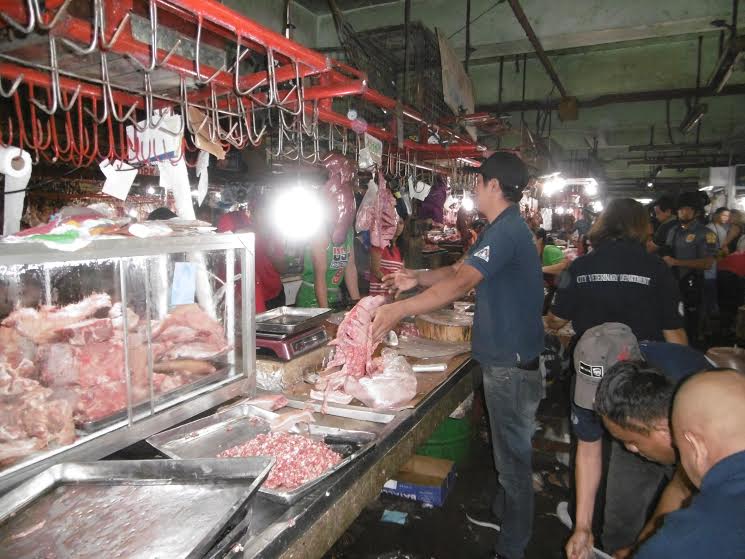
Meat inspectors from the Quezon City Veterinary Department seize mishandled frozen meat from the Commonwealth Market on Dec. 20, 2016. (Photo courtesy of the QC Veterinary Department)
MANILA — Around 150 kilos of mishandled frozen meat were confiscated by veterinary officials of Quezon City at the Commonwealth Market after a surprise inspection early Tuesday.
The goods were worth around P20,000 and were seized from four or five meat stalls around 4 a.m. by inspectors of the City Veterinary Department, just as vendors were beginning their day.
Accompanied by six operatives from the Special Weapons and Tactics (SWAT) team of the Quezon City Police District, the officials swept through the market and found the thawing meat in unsanitary conditions.
Dr. Ana Maria Cabel, department head, said the meat should have been kept in chillers or refrigerators.
“These should be maintained in a certain temperature. When you thaw and leave these exposed to room temperature, these could be contaminated with bacteria,” she told the Philippine Daily Inquirer.
Cabel said the seized meat was mostly composed of different pig’s parts, such as ears, face, root of the tongue and intestines.
She noted that the meat parts were imported and they entered the Philippine market from the United States, Australia and Canada, where they were often unwanted and discarded.
In the Philippines, however, these make up unique Filipino dishes, such as sisig and isaw.
But the doctor warned that contaminated meat could cause food poisoning, vomiting, loose bowel movement, dehydration and even death, in extreme cases.
“Wet markets are not really fit to handle frozen meats, given that they do not have the equipment,” said Cabel, comparing them to groceries and meat shops that were usually complete with refrigerators for proper meat storage.
“But these frozen meat are sold at cheaper prices to the vendors, at P130 to P150 a kilo, compared to P200 for freshly slaughtered ones,” she noted.
Cabel said the meat vendors were warned two months ago to comply with the requirements of the Meat Inspection Code of the Philippines, or Republic Act No. 9296.
They have also been given three warnings, or risk the confiscation of their goods and the possible revocation of their business permits.
During their inspection at Commonwealth Market, Cabel noted that nearly 70 percent of meat vendors complied with safety regulations and already got freezers.
In 2015, officials seized around 700 to 1,000 kilos of contaminated meat in the same market place.
This year, other than a woman yelling for the return of her goods, the inspection went without much incident.
The veterinary office will continue its regular monitoring of meat vendors, especially this holiday season.
Last week, they confiscated around 200 kilos from Novaliches and Balintawak markets.
Cabel advised consumers to be more cautious in buying food and other goods for their noche buena or media noche.
“It is better to buy freshly slaughtered meat in wet markets and frozen goods in grocery stores,” she noted.
Fresh pig’s meat should be pinkish in color, while cow’s should be reddish. Consumers must also look out for foul odor and slimy texture in their meats.
“If your frozen meat is not in frozen state, don’t buy it even if it may be cheaper,” she said. “It will spoil much easier, and may even have double-dead meat mixed in them.” SFM